|
|
|
Sort Order |
|
|
|
Items / Page
|
|
|
|
|
|
|
| Srl | Item |
| 1 |
ID:
138088
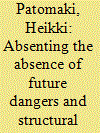

|
|
|
|
|
| Summary/Abstract |
One of the great appeals of securitization theory, and a major reason for its success, has been its usefulness as a tool for empirical research: an analytic framework capable of practical application. However, the development of securitization has raised several criticisms, the most important of which concern the nature of securitization theory. In fact, the appropriate methods, the research puzzles and type of evidence accepted all derive to a great extent from the kind of theory scholars bequeath their faith to. This Forum addresses the following questions: What type of theory (if any) is securitization? How many kinds of theories of securitization do we have? How can the differences between theories of securitization be drawn? What is the status of exceptionalism within securitization theories, and what difference does it make to their understandings of the relationship between security and politics? Finally, if securitization commands that leaders act now before it is too late, what status has temporality therein? Is temporality enabling securitization to absorb risk analysis or does it expose its inherent theoretical limits?
|
|
|
|
|
|
|
|
|
|
|
|
|
|
|
|
| 2 |
ID:
188930
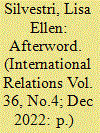

|
|
|
|
|
| Summary/Abstract |
How should we think about war today? This afterword assesses the impact of using a temporal lens to understand contemporary conflict. Reflecting upon my own work on media and war alongside wider societal relationships to violence, I consider the ways in which new technologies and styles of warfighting change both our view of time and our understanding of war itself. In particular, I show how a shift from space to time helps focus attention on the personal and lived experience of US war, on the importance of routines both in constituting and obscuring wartime, on how many issues of contemporary war have become a matter of digitized perspective, and finally how emergent technologies have unsettled familiar temporal patterns of conflict. War today is media-drenched but struggles to occupy our attention over sustained periods. It remains an epochal political force that we tend to approach through deeply individualized, microcosmic stories. It proceeds at breakneck pace but rarely gets anywhere. These questions and tensions underline the importance of focusing not only on the resolutely temporal aspects of wartime, but also on the way in which shifts in time are changing the very nature and politics of war in the 21st century.
|
|
|
|
|
|
|
|
|
|
|
|
|
|
|
|
| 3 |
ID:
119954
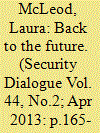

|
|
|
|
|
| Publication |
2013.
|
| Summary/Abstract |
Contemporary debates about security narratives highlight different forms of security: gender security, realist security or human security. The use of such terms often means that we do not recognize subtle variances within these narratives or the implications of these divergences. This article suggests and illustrates a way of achieving a deeper understanding of security narratives through investigating the temporal aspects of narrative content. A case study exploring three forms of gender security narratives among activists of feminist and women's organizations in Serbia is used to demonstrate that similar perceptions of gender security exist. However, paying attention to the temporal discontinuities within the contents of these gender security narratives makes it possible to identify divergences connected to personal-political imaginations of conflict and post-conflict. These subtle variations in content are potentially product and productive of different policy prescriptions and outcomes. This article concludes by reflecting upon the presence of our past and future in the contents of our contemporary security narratives, suggesting that when we consider security, our analysis should aim to incorporate an understanding of the temporal nature of a security narrative.
|
|
|
|
|
|
|
|
|
|
|
|
|
|
|
|
| 4 |
ID:
184072
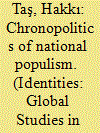

|
|
|
|
|
| Summary/Abstract |
Inspired by the populists’ salient urge to recalibrate and locate contingent developments within a larger temporal order and establish historical continuity, this paper dwells on the chronopolitics of national populism and calls for a systematic treatment of time in these movements. Focusing on the neglected narrative dimension, such an inquiry will afford an alternative reading from which to engage with and critique the magnitude of populism. This study argues that despite ample variance and claims of uniqueness, national populisms employ a shared temporal template that accounts for a particular national subjectivity through a set of timing and sequencing of events complemented by affective stimuli. It focuses on the case of Turkey. More pronounced since 2013 Gezi Protests, the rising tide of national populism under President Tayyip Erdoğan’s rule encapsulates how these populisms conflate the past, present, and future into a single narrative about the people’s survival and prosperity.
|
|
|
|
|
|
|
|
|
|
|
|
|
|
|
|
| 5 |
ID:
188925
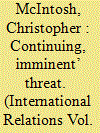

|
|
|
|
|
| Summary/Abstract |
For nearly two decades, the United States has chosen to narrate its response to terrorism through what Judith Butler refers to as the ‘frame of war’. Despite this, victory in that country’s longest war remains largely unimaginable. In some ways this is a problem of time – it is not that victory or an end to the conflict is literally unimaginable, it’s that from our political present, an end appears radically discontinuous. This article builds on recent work using temporality and the political present as a lens and conceptual framework to better understand how temporal assumptions and frames shape the practice of war and political violence. In this article, I show how time and timing play a significant role in justifying the violence of the war on terrorism and in making it intelligible as war. I examine the past three administrations and focus on three areas – the borders of wartime, temporal continuity, and the vision of a post-war future – to show important differences in administrative approaches. To more concretely understand the practice of political violence going forward, attention to the temporal dynamics of politics must be front and center, particularly one possessing ambivalent frames. Doing so reveals the implications these dynamics have for the conduct and permissibility of violence.
|
|
|
|
|
|
|
|
|
|
|
|
|
|
|
|
| 6 |
ID:
085122
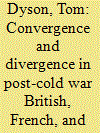

|
|
|
|
|
| Publication |
2008.
|
| Summary/Abstract |
Post-Cold War military reforms in Britain, France, and Germany have been characterized by patterns of convergence in the objectives, instruments, and institutional forums of defense policy but by divergence in temporality. These patterns of convergence and divergence cannot be fully explained by cultural approaches. Neither can they be explained solely by a focus on the role of international structure, as neo-realism posits, although the post-Cold War distribution of capabilities is driving Britain, France, and Germany toward policy convergence. Instead, the analysis builds upon the insights of neoclassical realism. Culture emerges not so much as a cause of action as instrumental and a resource for policy leaders in the domestic political and temporal management of reform.
|
|
|
|
|
|
|
|
|
|
|
|
|
|
|
|
| 7 |
ID:
152522
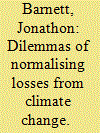

|
|
|
|
|
| Summary/Abstract |
The idea that climate change may cause the loss of atoll countries is now taken for granted in much of climate change science, policy and media coverage. This normalisation of loss means atoll countries now face a future that is apparently finite, which is a grievous situation no other country has to contend with. This paper explains the dilemmas this presents to atoll countries. If there is a risk of forced migration, then strategic planning can minimise its social impacts. Yet, doing so may bring future dangers into the present by undermining efforts to facilitate adaptation to climate change, creating new identities and deterring investments in sustainable resource management. To overcome this dilemma, the paper argues for a more hopeful approach to the future of atoll countries, because for as long as the science of loss remains uncertain, and the limits to adaptation are unknown, forced migration cannot be taken as a matter of fact and could possibly be averted through emission reductions and a vastly improved and significantly more creative approach to adaptation.
|
|
|
|
|
|
|
|
|
|
|
|
|
|
|
|
| 8 |
ID:
190771


|
|
|
|
|
| Summary/Abstract |
Through semi-structured interviews with Senegalese fishermen, this article examines their displacement following the depletion of fishing stocks in Senegalese waters owing to the activities of European and Asian industrial fleets over the last two decades. While there has been some recognition in scholarship that extractivism leads to dire precarity and displacement within local populations, it has not been demonstrated how exploitations at sea are dependent on the displacement of the indigenous people for corporate gains. Thus, this article conceptualizes displacement of local Senegalese fishermen as the product of an active, arguably deliberate process, solely motivated by corporate gains to the detriment of their communal and human life. Furthermore, the article shows that displacement can take on multiple forms such as economic and temporal as well as physical movement. Data is drawn from eighteen semi-structured interviews with fishers from three fishing villages.
|
|
|
|
|
|
|
|
|
|
|
|
|
|
|
|
| 9 |
ID:
187511


|
|
|
|
|
| Summary/Abstract |
This paper explores the temporal dimensions in and consequences of migration from the perspective of how they are involved in both promoting and undermining cosmopolitan attitudes and practices amongst mobile subjects. Drawing on qualitative research with new Chinese migrants to New Zealand, the paper explores how their process of becoming cosmopolitan to participate in intercultural interactions is constructed differently in relation to momentary, everyday, remembered and imagined times/temporalities embedded in their lives. In particular, the paper asks whether and how migrant individuals navigate through temporal dissonance occurred across the migratory process by engaging in or retreating from cosmopolitanism. Essentially, this paper develops a temporally-sensitive theoretical approach to unpack how time and temporalities function in the migration process, especially how they articulate with the possibilities of migrant individuals encountering diversity and obtaining a sense of home in the host society, thus contributing to studies of cosmopolitanism and time in migration.
|
|
|
|
|
|
|
|
|
|
|
|
|
|
|
|
| 10 |
ID:
138085
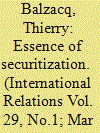

|
|
|
|
|
| Summary/Abstract |
One of the great appeals of securitization theory, and a major reason for its success, has been its usefulness as a tool for empirical research: an analytic framework capable of practical application. However, the development of securitization has raised several criticisms, the most important of which concern the nature of securitization theory. In fact, the appropriate methods, the research puzzles and type of evidence accepted all derive to a great extent from the kind of theory scholars bequeath their faith to. This Forum addresses the following questions: What type of theory (if any) is securitization? How many kinds of theories of securitization do we have? How can the differences between theories of securitization be drawn? What is the status of exceptionalism within securitization theories, and what difference does it make to their understandings of the relationship between security and politics? Finally, if securitization commands that leaders act now before it is too late, what status has temporality therein? Is temporality enabling securitization to absorb risk analysis or does it expose its inherent theoretical limits?
|
|
|
|
|
|
|
|
|
|
|
|
|
|
|
|
| 11 |
ID:
171297


|
|
|
|
|
| Summary/Abstract |
Through a methodology that I term ‘embodied philology’, I trace a genealogy of mazaa as an understanding of enjoyment calibrated through the indices of taste and time. Using this genealogy to mark out an ‘alegropolitics’, or a politics of happiness, I extract its political potential in two ways: first, by assessing it through scholarship on the archive, repertoire, and what Spanish calls sabor, and, second, by applying these ideas, gleaned largely through scholarship from Latin America, to the assessment of Bollywood’s masala repertoire and film star Govinda’s role therein. Govinda’s subscription to a Bhojpuri performativity leads me to relocate mazaa within a decolonising agenda for pleasure formed through transnational and cross-border communities united by an embodied memory of collective enjoyment. A vignette from the 2018–19 Kochi-Muziris Biennale allows me to demonstrate how such memory may be activated to transform the present.
|
|
|
|
|
|
|
|
|
|
|
|
|
|
|
|
| 12 |
ID:
188856
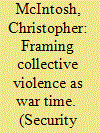

|
|
|
|
|
| Summary/Abstract |
Writing on the US war on terrorism, Judith Butler identified how discursive frames are produced and reproduced in ways that make certain forms of violence discernable as war. These frames that make war an intelligible form of political violence are not only spatial, but irreducibly temporal in nature. Their circulation–e.g., the framing of US counter-terror efforts as ‘war’ – enables some lives to be understood as grievable, while others lack political and normative value. These frames not only determine what is and is not a war, but whose deaths represent an unremarkable facet of peacetime. This article explores one instance where the circulation of these frames had the potential for rupture – the 2016 shooting at the Pulse nightclub in Orlando. First, it use the event’s liminal status as a ‘terrorist attack’ to make visible the frame(s) operating in the contemporary US political present to render certain acts of violence intelligible as political violence, terrorism, or war. Second, it explores the temporal dimension of these frames, showing how they function together within national security narratives to authorize certain forms of violence as exceptional. This article concludes by exploring the potential for ‘timing’ this violence differently as a means of political resistance.
|
|
|
|
|
|
|
|
|
|
|
|
|
|
|
|
| 13 |
ID:
142561
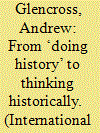

|
|
|
|
|
| Summary/Abstract |
Although most attempts to foster interdisciplinary dialogue are located outside mainstream International Relations (IR), this article seeks to problematize how the two dominant paradigms of IR theory, realism and liberalism, think historically. The argument proceeds by examining how the disciplines consider what historical knowledge is useful for, that is, how they think historically or are historically conscious. This constitutes a shift away from the dominant dialogue over how to ‘do history’ in IR. Historical consciousness is defined as the understanding of the temporality of historical experience or how past, present and future are thought to be connected. The analysis is set up to explore the extent to which both disciplines share a similar historical consciousness beyond merely treating history as instructive. To do so the article first examines the canon of European historiography to identify three genres of historical consciousness: history as teacher, history as narrative, history as representation. This survey of pre-positivist historiography serves to show the complexity of historical reflection within that discipline, something against which variance within IR theory can also be compared. Disciplinary comparison reveals that three genres of historical consciousness are present in liberalism and realism: lessons of history, revenge of history, and among progressive realists a speculative escape from history genre. Whereas lessons of history spans both ‘isms’ in IR, realism is shown to have a more complex understanding of temporality, thereby providing another conceptual starting point for distinguishing between these two ‘traditions’. Moreover, these differences between genres of historical consciousness used within realism capture the split between realists that lies not in the origin of anarchy itself but in how realists think historically. What emerges, therefore, by comparing how disciplines think historically rather than ‘do’ History, is the equally purposive or even political use of the historical knowledge they produce.
|
|
|
|
|
|
|
|
|
|
|
|
|
|
|
|
| 14 |
ID:
159793
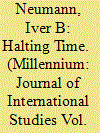

|
|
|
|
|
| Summary/Abstract |
Drawing on identity and prototype theory, the article sets out to analyse the historically dominant monumentalising ways in which polities try to shore up their own Selves by halting their Others in time. The first part of the article discusses how monuments represent Self/Other relations from ancient Mesopotamia in the East to modern Britain in the West by limning off a constitutive outside, be that as visual absence or presence. Temporality is of the essence here, with the basic idea being that the Self is in temporal motion, while the Other is literally petrified. I then postulate that the Other is halted in time in three basic ways: as visual absence, as dead and as subjugated. Crucially, however, the Second World War is actually the end point of the extraordinary stability of monumental ways in which to represent the Other. We see the tentative emergence and damning of a fourth Other, namely a previous incarnation of the Self. I conclude, with Norbert Elias, that the fading away of the Other as dead and as subjugated is significant as part of a civilisation process that works against denying the Other its future agency.
|
|
|
|
|
|
|
|
|
|
|
|
|
|
|
|
| 15 |
ID:
138249
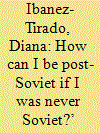

|
|
|
|
|
| Summary/Abstract |
Based on anthropological fieldwork conducted in the Kulob region of southern Tajikistan, this paper examines the extent to which the existing periodization ‘Soviet/post-Soviet’ is still valid to frame scholarly works concerning Central Asia. It does so through an analysis of ‘alternative temporalities’ conveyed by Kulob residents to the author. These alternative temporalities are fashioned in especially clear ways in a relationship to the physical transformations occurring to two types of housing, namely flats in building blocks and detached houses. Without arguing that the categories ‘Soviet’ and ‘post-Soviet’ have become futile, the author advocates that the uncritically use of Soviet/post-Soviet has the unwanted effect of shaping the Central Asian region as a temporalized and specialized ‘other’.
|
|
|
|
|
|
|
|
|
|
|
|
|
|
|
|
| 16 |
ID:
120405
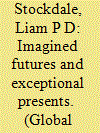

|
|
|
|
|
| Publication |
2013.
|
| Summary/Abstract |
This article critically considers what is at stake with the emergence of a 'pre-emptive' politics of security based upon governing the future through anticipatory interventions in the present. It begins by developing a detailed account of how the idea of pre-emption has come to inform the global governance of (in)security in the post-9/11 era. It then turns to a discussion of the logic of pre-emptive security itself. Here it is argued that its focus upon the future implies a prioritization of the imagination in its decisional logic, which has the effect of enhancing the degree of discretionary subjectivity granted to state authorities under a pre-emptive approach. The article then expands upon this claim by considering how it suggests an important conceptual link between a politics of pre-emption and political exceptionalism. It then concludes that the very notion of pre-emptive security can be seen as conceptually incoherent, since this link serves to compromise its capacity to produce a condition congruent with the understanding of 'security' presupposed by its own normative framework. Accordingly, the practical viability and political legitimacy of pre-emption as a rationality for (in)security governance can be seriously called into question.
|
|
|
|
|
|
|
|
|
|
|
|
|
|
|
|
| 17 |
ID:
138084
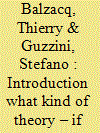

|
|
|
|
|
| Summary/Abstract |
One of the great appeals of securitization theory, and a major reason for its success, has been its usefulness as a tool for empirical research: an analytic framework capable of practical application. However, the development of securitization has raised several criticisms, the most important of which concern the nature of securitization theory. In fact, the appropriate methods, the research puzzles and type of evidence accepted all derive to a great extent from the kind of theory scholars bequeath their faith to. This Forum addresses the following questions: What type of theory (if any) is securitization? How many kinds of theories of securitization do we have? How can the differences between theories of securitization be drawn? What is the status of exceptionalism within securitization theories, and what difference does it make to their understandings of the relationship between security and politics? Finally, if securitization commands that leaders act now before it is too late, what status has temporality therein? Is temporality enabling securitization to absorb risk analysis or does it expose its inherent theoretical limits?
|
|
|
|
|
|
|
|
|
|
|
|
|
|
|
|
| 18 |
ID:
172373


|
|
|
|
|
| Summary/Abstract |
Like all contested concepts, the term ‘Levant’ is unstable. Both its academic and political uses are geographically and historically fairly loose and ill-defined. This geo-historical instability makes room for the multiplicity of chronotopes that the contributors lay out in this special issue. In order to bring these contributions together, we also use the theoretical concept of the chronotope, the way that authors and actors under study bring together time and space in their legitimation of political efforts in the present. The chronotopes treated here have far-reaching implications in our experience and knowledge of the Levant. With Bakhtin’s chronotopic method, we approach the region through its entangled history, taking people’s mobility, their composite identities, and the major transformations in their lives as the central concern for analysis.
|
|
|
|
|
|
|
|
|
|
|
|
|
|
|
|
| 19 |
ID:
167658
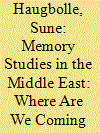

|
|
|
|
|
| Summary/Abstract |
This article takes stock of the field of memory studies and where it has moved since the Arab uprisings. If the 1990s marked the first interest in memory studies, the 2000s opened the floodgates to a variety of approaches and localities. The aim is not to present a complete catalogue of memory studies in the Middle East, but rather to highlight some of the trends and patterns in the field and its development over time. It does so both by discussing key works and by focusing on an examination of memory studies about contemporary Lebanon. The article argues that memory studies in the 1990s drew on a particular understanding of transition that came to an abrupt end with the Arab Uprisings. 2011 marked a turning point both in the way the uprisings made scholars question the national framework previously privileged, and by stoking an interest in memories and histories of revolts other than those connected to the anti-colonial struggle. The latest wave of memory studies investigates the uses of online archives and the archive as metaphor for how storage functions for human memory, introducing new methodologies and theoretical directions.
|
|
|
|
|
|
|
|
|
|
|
|
|
|
|
|
| 20 |
ID:
137921


|
|
|
|
|
| Summary/Abstract |
Travel for educational purposes, once the privilege of the upper class, has become a global mass phenomenon in recent years. This special issue examines, within different cultural and historical contexts, the close relationship between migration, education and social mobility. Adopting the perspective that education includes a broad range of formative experiences, the articles explore different educational trajectories and the local, regional and transnational relations in which they are embedded. Three key issues emerge from the analyses: firstly, the central role of temporality in terms of both the overall historical conditions and the specific biographical circumstances shaping educational opportunities; secondly, the complex agendas informing individuals’ migration and the adjustment of these agendas in the light of the vagaries of migrant life; and thirdly, the importance of migrants’ self-perception as ‘educated persons’ and the invention of new, and the maintaining of old, identities that this involves.
|
|
|
|
|
|
|
|
|
|
|
|
|
|
|
|
|
|
|
|
|